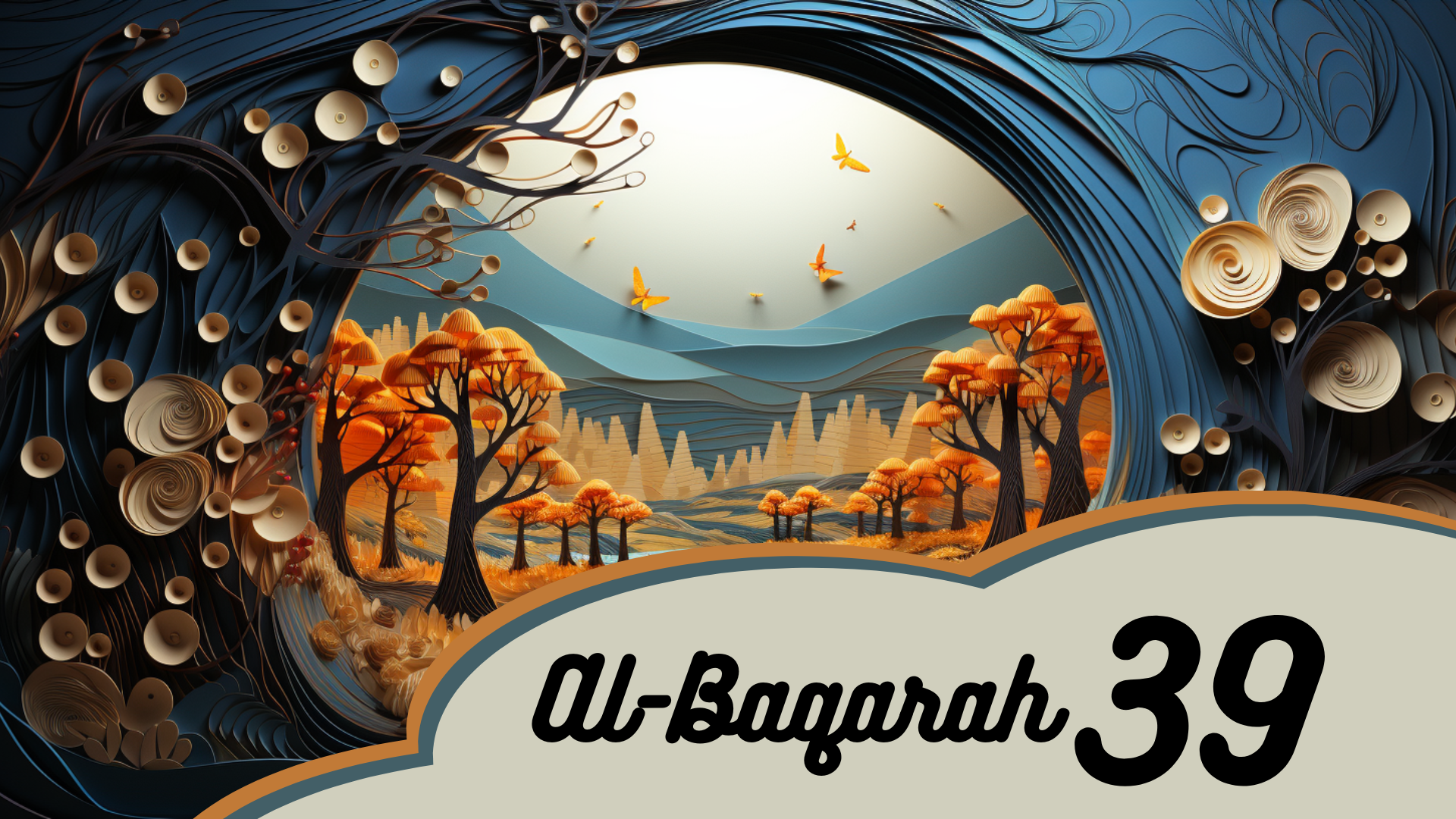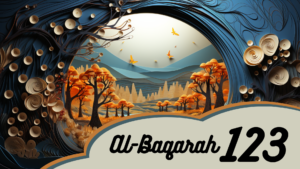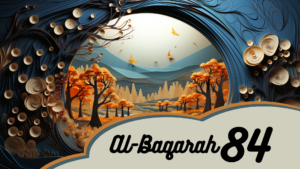In this article, we explore the profound meaning behind Verse 39 of Surah Al-Baqarah. With a focus on providing a detailed interpretation of this verse, we aim to shed light on its significance and how it can be applied in the daily lives of Muslims. Through an examination of the context and implications of this verse, we delve into its teachings and offer insights that can resonate with believers seeking a deeper understanding of their faith. Join us as we explore the rich meaning behind Verse 39 of Surah Al-Baqarah and its relevance in the lives of Muslims today.
Verse 39 of Surah Al-Baqarah
Overview of Surah Al-Baqarah
Surah Al-Baqarah, which means “The Cow,” is the second chapter of the Qur’an and one of the longest chapters. It consists of 286 verses and covers a wide range of topics, providing guidance on various aspects of life. The chapter addresses the Israelites, the early Muslims, and humanity as a whole, imparting valuable lessons and teachings.
Context of Verse 39
Verse 39 of Surah Al-Baqarah is part of the story of Adam and Eve, which is mentioned in several places in the Qur’an. It sheds light on their creation, residence in Paradise, and the temptation that led to their disobedience and subsequent expulsion from Paradise. The story serves as a potent reminder to humankind about the importance of obedience to Allah’s commandments and the consequences of disobedience.
Translation and Interpretation of Verse 39
The translation of verse 39 of Surah Al-Baqarah is as follows:
“And when We said, ‘O Adam, dwell, you and your wife, in Paradise and eat therefrom in [ease and] abundance from wherever you will. But do not approach this tree, lest you be among the wrongdoers.'”
This verse highlights the instruction given by Allah to Adam and Eve regarding their residence in Paradise. They were granted the freedom to enjoy the bounties of Paradise while being prohibited from approaching a specific tree. Disobeying this command would make them among the wrongdoers.
Story of Adam and Eve
Adam and Eve’s Creation
Adam and Eve, also known as Hawwa in Arabic, were the first human beings created by Allah. Their creation holds immense significance in Islamic beliefs. Allah created Adam from clay and breathed His spirit into him, granting him life. Eve was then created from Adam’s rib to be his companion and to play a vital role in the continuation of human existence.
Adam and Eve’s Residence in Paradise
After their creation, Allah placed Adam and Eve in Paradise, an exquisite abode of eternal bliss and serenity. In Paradise, they enjoyed unimaginable beauty, endless provisions, and the proximity to Allah’s presence. They were free from pain, sorrow, and any physical or emotional hardships. It was a state of complete peace and harmony.
The Temptation and Disobedience
However, their tranquil existence took a sudden turn when Satan, the enemy of humanity, tempted them to eat from the forbidden tree. Satan, driven by arrogance and envy, deceived Adam and Eve into disobeying Allah by promising them immortality and eternal kingdom. Due to their lack of experience and vulnerability, they succumbed to the temptation and consumed the forbidden fruit.
The Prohibition of the Forbidden Tree
The Forbidden Tree
The forbidden tree, also referred to as the tree of knowledge or the tree of immortality, represented a test of obedience for Adam and Eve. Although the exact identity of the tree is not mentioned in the Qur’an, scholars have various interpretations. Some believe it to be a literal tree, while others consider it symbolic, representing the limits and boundaries set by Allah.
The Prohibition from Consuming the Fruit
Allah explicitly commanded Adam and Eve not to approach or consume the fruit of the forbidden tree. This prohibition was a way to test their obedience, to remind them of their limitations as creatures, and to demonstrate their trust and submission to Allah’s guidance. It was a straightforward command from their Creator, meant to protect them from harm and maintain the harmony of Paradise.
Significance of Verse 39 in Muslim Daily Lives
The lesson of Obedience to Allah
Verse 39 of Surah Al-Baqarah serves as a profound lesson for Muslims in understanding the significance of obedience to Allah’s commandments. Just as Adam and Eve were given specific instructions by Allah, Muslims are also obligated to follow the teachings and guidance of the Qur’an, the Prophet Muhammad (peace be upon him), and the scholars. Obedience is a demonstration of faith and a means to attain closeness to Allah.
Importance of Following Allah’s Commandments
This verse underscores the importance of adhering to Allah’s commandments and avoiding what He has forbidden. Allah, in His infinite wisdom, has set boundaries and provided guidance for humankind to lead a righteous and fulfilling life. Muslims are encouraged to abide by these commandments, not only as an act of worship but also to uphold justice, morality, and the well-being of society as a whole.
Understanding the Consequences of Disobedience
Verse 39 also emphasizes the consequences of disobedience to Allah’s commands. Adam and Eve’s disobedience led to their expulsion from Paradise, a loss of their elevated status, and the beginning of hardships and struggles in their earthly life. For Muslims, this serves as a reminder that disobedience has consequences, both in this world and in the Hereafter. It highlights the need to seek forgiveness, repentance, and to rectify one’s actions when mistakes are made.
The Wisdom Behind the Story
Divine Knowledge and Wisdom
The story of Adam and Eve, including verse 39, demonstrates the divine knowledge and wisdom of Allah. He knew that Adam and Eve would be tempted by Satan and would disobey His command. However, this was not a failure on Allah’s part, but a part of His divine plan to test humanity’s obedience, to grant them free will, and to show them the path of forgiveness and redemption.
Human Free Will and Responsibility
The story also highlights the concept of human free will and the responsibility that accompanies it. Adam and Eve had the ability to choose between obedience and disobedience. They were accountable for their actions and faced the consequences of their choices. Similarly, Muslims are bestowed with free will and are accountable for their deeds and decisions. They have the responsibility to make choices that align with Allah’s guidance.
Lessons of Forgiveness and Repentance
Despite their disobedience, Allah’s mercy and forgiveness were abundantly evident. Adam and Eve sincerely sought Allah’s forgiveness and were forgiven. This highlights the immense mercy and compassion of Allah towards His creation. Muslims are encouraged to seek forgiveness and repentance whenever they make mistakes or deviate from the right path. They should turn to Allah with sincerity, seeking His forgiveness and committing to positive change.
In conclusion, verse 39 of Surah Al-Baqarah, within the broader context of Adam and Eve’s story, holds great significance for Muslims. It serves as a reminder of the importance of obedience to Allah’s commandments, the consequences of disobedience, and the lessons of forgiveness and repentance. Muslims are urged to learn from this story and apply its teachings in their daily lives, seeking Allah’s guidance, and striving towards righteousness.




